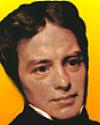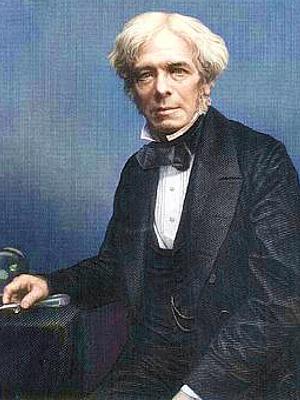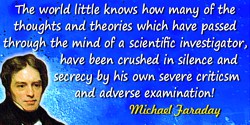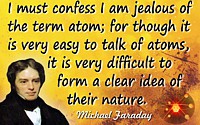 (source)
(source)
|
Michael Faraday
(22 Sep 1791 - 25 Aug 1867)
English physicist and chemist who was a great experimentalist. His major contributions included the early understanding of electromagnetism.
|
SCIENTIFIC WORTHIES
l.—FARADAY
Michael Faraday, born September 22, 1791, died August 25, 1867.
[p.397] WITH this number of NATURE we present to our subscribers the first of what we hope will be a long series of Portraits of Eminent Men of Science.
This first portrait is one of Faraday, engraved on steel, by Jeens, from a photograph by Watkins. Those who had the happiness of knowing Faraday best will best appreciate the artist’s skill—he has indeed surpassed himself, for the engraving is more life-like than the photograph. We could ill spare such a memorial of such a man, one in which all the beautiful simplicity of his life beams upon us. There is no posturing here!
There is no need that we should accompany the portrait with a memoir of Faraday. Bence Jones, Tyndall, and Gladstone have already lovingly told the story of the grand and simple life which has shed and will long continue to shed such lustre on English Science, and their books have carried the story home to millions; nor is there any need that we should state why we have chosen to commence our series with Faraday; everybody will acknowledge the justice of our choice.
But there is great need just now that some of the lessons to be learnt from Faraday’s life should be insisted upon, and we regard it as a fortunate circumstance that we have thus the opportunity of insisting upon them while our Scientific Congress is in session, and before the echoes of the Address of the President of the British Association for the Advancement of Science have died away.
In the first place, then, we regard Faraday at once as the most useful and the most noble type of a scientific man. The nation is bigger and stronger in that Faraday has lived, and the nation would be bigger and stronger still were there more Faradays among us now. Prof. Williamson, in his admirable address, acknowledges that the present time is “ momentous.” In truth the question of the present condition of Science and the ways of improving it, is occupying men’s minds more than it has ever done before; and it is now conceded on all sides that this is a national question, and not only so, but one of fundamental importance. Now what is the present condition of English Science? It is simply this, that while the numbers of our professors and their emoluments are increasing, while the number of students is increasing, while practical instruction is being introduced and textbooks multiplied, while the number and calibre of popular lecturers and popular writers in Science is increasing, original research, the fountain-head of a nation’s wealth, is decreasing.
Now a scientific man is useful as such to a nation according to the amount of new knowledge with which he endows that nation. This is the test which the nation, as a whole, applies, and Faraday’s national reputation rests on it. Let the nation know then that the real difficulty at present is this ; we want more Faradays ; in other words more men working at new knowledge.
It is refreshing to see this want so clearly stated in the Presidential Address:
“The first thing wanted for the work of advancing science is a supply of well-qualified workers. The second thing is to place and keep them under the conditions most favourable to their efficient activity. The most suitable men must be found while still young, and trained to the work. Now I know only one really effectual way of finding the youths who are best endowed by nature for the purpose; and that is to systematise and develop the natural conditions which accidentally concur in particular cases, and enable youths to rise from the crowd.
“Investigators, once found, ought to be placed in the circumstances most favourable to their efficient activity.
“The first and most fundamental condition for this is, that their desire for the acquisition of knowledge be kept alive and fostered. They must not merely retain the hold which they have acquired on the general body of their science; they ought to strengthen and extend that hold, by acquiring a more complete and accurate knowledge of its doctrines and methods; in a word, they ought to be more thorough students than during their state of preliminary training.
“They must be able to live by their work, without diverting any of their energies to other pursuits; and they must feel security against want, in the event of illness or in their old age.
“They must be supplied with intelligent and trained assistants to aid in the conduct of their researches, and whatever buildings, apparatus, and materials may be required for conducting those researches effectively.
“The desired system must therefore provide arrangements favourable to the maintenance and development of the true student-spirit in investigators, while providing them with permanent means of subsistence, sufficient to enable them to feel secure and tranquil in working at science alone, yet not sufficient to neutralise their motives for exertion; and at the same time it must give them all external aids, in proportion to their wants and powers of making good use of them.”
Whether the scheme proposed by Dr. Williamson to bring such a state of things about will have the full success he anticipates is a matter of second-rate importance; what is of importance is, that the need of some scheme is now fully recognised.
So far the remarks we have made have been suggested by Faraday’s usefulness. It is to be hoped that the nobleness of his simple, undramatic life, will live as long in men’s memories as the discoveries which have immortalised his name. Here was no hunger after popular applause, no jealousy of other men’s work, no swerving from the well-loved, self-imposed task of “working, finishing, publishing.”
“The simplicity of his heart, his candour, his ardent love of the truth, his fellow-interest in all the successes, and ingenuous admiration of all the discoveries of others, his natural modesty in regard to what he himself discovered, his noble soul—independent and bold—all these combined, gave an incomparable charm to the features of the illustrious physicist.”
Such was his portrait as sketched by Dumas, a man cast in the same mould. All will recognise its truth. Can men of science find a nobler exemplar on which to fashion their own life? Nay, if it were more widely followed than it is, should we not hear less of men falling away from the “brilliant promise” of their youth, tempted by “fees,” or the “applications of Science,” or the advantages attendant upon a popular exposition of other men’s work ? Should [p.398] we not hear a little less frequently than we do that research is a sham, and that all attempts to aid it savour of jobbery?
Lastly we may consider Faraday’s place in the general history of Science; this is far from easy. Our minds are still too much occupied with the memory of the outward form and expression of his scientific work to be able to compare him aright with the other great men among whom we shall have to place him.
Every great man of the first rank is unique. Each has his own office and his own place in the historic procession of the sages. That office did not exist even in the imagination, till he came to fill it, and none can succeed to his place when he has passed away. Others may gain distinction by adapting the exposition of science to the varying language of each generation of students, but their true function is not so much didactic as pedagogic—not to teach the use of phrases which enable us to persuade ourselves that we understand a science, but to bring the student into living contact with the two main sources of mental growth, the fathers of the sciences, for whose personal influence over the opening mind there is no substitute, and the material things to which their labours first gave a meaning.
Faraday is, and must always remain, the father of that enlarged science of electro-magnetism which takes in at one view, all the phenomena which former inquirers had studied separately, besides those which Faraday himself discovered by following the guidance of those convictions, which he had already obtained, of the unity of the whole science.
Before him came the discovery of most of the fundamental phenomena, the electric and magnetic attractions and repulsions, the electric current and its effects. Then came Cavendish, Coulomb, and Poisson, who by following the path pointed out by Newton, and making the forces which act between bodies the principal object of their study, founded the mathematical theories of electric and magnetic forces. Then Örsted discovered the cardinal fact of electro-magnetic force, and Ampère investigated the mathematical laws of the mechanical action between electric currents.
Thus the field of electro-magnetic Science was already very large when Faraday first entered upon his public career. It was so large that to take in at one view all its departments required a stretch of thought for which a special preparation was necessary. Accordingly, we find Faraday endeavouring in the first place to obtain, from each of the known sources of electric action, all the phenomena which any one of them was able to exhibit. Having thus established the unity of nature of all electric manifestations, his next aim was to form a conception of electrification, or electric action, which would embrace them all. For this purpose it was necessary that he should begin by getting rid of those parasitical ideas, which are so apt to cling to every scientific term, and to invest it with a luxuriant crop of connotative meanings flourishing at the expense of the meaning which the word was intended to denote. He therefore endeavoured to strip all such terms as “electric fluid,” “current,” and “ attraction” of every meaning except that which is warranted by the phenomena themselves, and to invent new terms, such as “ electrolysis,” “electrode,” “dielectric,” which suggest no other meaning than that assigned to them by their definitions.
He thus undertook no less a task than the investigation of the facts, the ideas, and the scientific terms of electromagnetism, and the result was the remodelling of the whole according to an entirely new method.
That old and popular phrase, “electric fluid,” which is now, we trust, banished for ever into the region of newspaper paragraphs, had done what it could to keep men’s minds fixed upon those particular parts of bodies where the “fluid “ was supposed to exist.
Faraday, on the other hand, by inventing the word “dielectric,” has encouraged us to examine all that is going on in the air or other medium between the electrified bodies.
It is needless to multiply instances of this kind. The terms, field of force, lines of force, induction, &c., are sufficient to recall them. They all illustrate the general principles of the growth of science, in the particular form of which Faraday is the exponent.
We have, first, the careful observation of selected phenomena, then the examination of the received ideas, and the formation, when necessary, of new ideas; and, lastly, the invention of scientific terms adapted for the discussion of the phenomena in the light of the new ideas.
The high place which we assign to Faraday in electromagnetic science may appear to some inconsistent with the fact that electromagnetic science is an exact science, and that in some of its branches it had already assumed a mathematical form before the time of Faraday, whereas Faraday was not a professed mathematician, and in his writings we find none of those integrations of differential equations which are supposed to be of the very essence of an exact science. Open Poisson and Ampère, who went before him, or Weber and Neumann, who came after him, and you will find their pages full of symbols, not one of which Faraday would have understood. It is admitted that Faraday made some great discoveries, but if we put these aside, how can we rank his scientific method so high without disparaging the mathematics of these eminent men?
It is true that no one can essentially cultivate any exact science without understanding the mathematics of that science. But we are not to suppose that the calculations and equations which mathematicians find so useful constitute the whole of mathematics. The calculus is but a part of mathematics.
The geometry of position is an example of a mathematical science established without the aid of a single calculation. Now Faraday’s lines of force occupy the same position in electromagnetic science that pencils of lines do in the geometry of position. They furnish a method of building up an exact mental image of the thing we are reasoning about. The way in which Faraday made use of his idea of lines of force in co-ordinating the phenomena of magneto-electric induction* shows him to have been in reality a mathematician of a very high order [p.399] —one from whom the mathematicians of the future may derive valuable and fertile methods.
For the advance of the exact sciences depends upon the discovery and development of appropriate and exact ideas, by means of which we may form a mental representation of the facts, sufficiently general, on the one hand, to stand for any particular case, and sufficiently exact, on the other, to warrant the deductions we may draw from them by the application of mathematical reasoning.
From the straight line of Euclid to the lines of force of Faraday this has been the character of the ideas by which science has been advanced, and by the free use of dynamical as well as geometrical ideas we may hope for a further advance. The use of mathematical calculations is to compare the results of the application of these ideas with our measurements of the quantities concerned in our experiments. Electrical science is now in the stage in which such measurements and calculations are of the greatest importance.
We are probably ignorant even of the name of the science which will be developed out of the materials we are now collecting, when the great philosopher next after Faraday makes his appearance.
- Science Quotes by Michael Faraday.
- 22 Sep - short biography, births, deaths and events on date of Faraday's birth.
- Michael Faraday on Pollution of the River Thames - Letter to the Editor, The Times (7 July 1885).
- Michael Faraday - Light-House Illumination - The Electric Light
- Michael Faraday - context of quote “You will soon be able to tax it!” - Medium image (500 x 350 px)
- Michael Faraday - context of quote “You will soon be able to tax it!” - Large image (800 x 600 px)
- Large color picture of Michael Faraday (800 x 1000 px)
- Michael Faraday - context of quote “Always cross-question an assertion” - Medium image (500 x 350 px)
- Michael Faraday - context of quote “Always cross-question an assertion” - Large image (800 x 600 px)
- Michael Faraday - context of quote “I am jealous of the term atom” - Medium image (500 x 350 px)
- Michael Faraday - context of quote “I am jealous of the term atom” - Large image (800 x 600 px)
- Michael Faraday, Christmas Lecturer - transcript of a 1940s radio talk by Charles F. Kettering.
- The Intangible in Human Progress - Michael Faraday mentioned in transcript of a 1940s radio talk by Charles F. Kettering.
- The Electric Life Of Michael Faraday, by Alan W. Hirshfeld. - book suggestion.
- Booklist for Michael Faraday.








